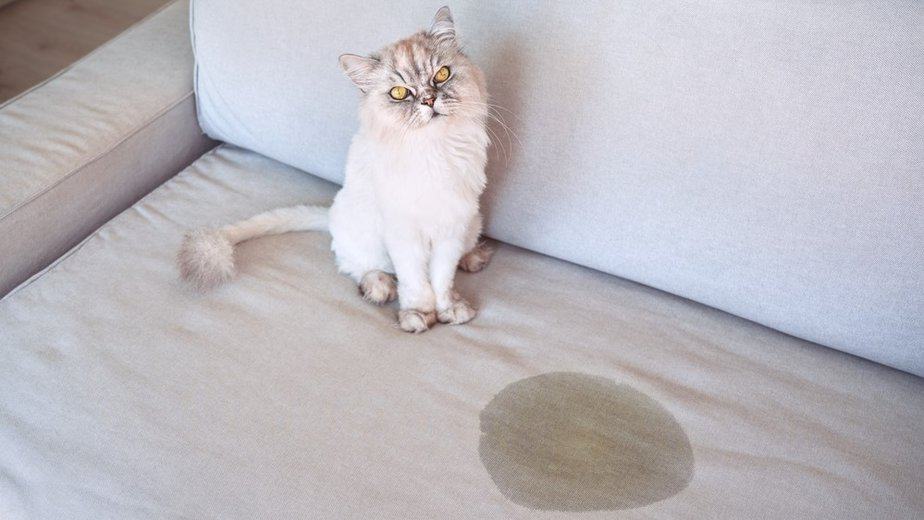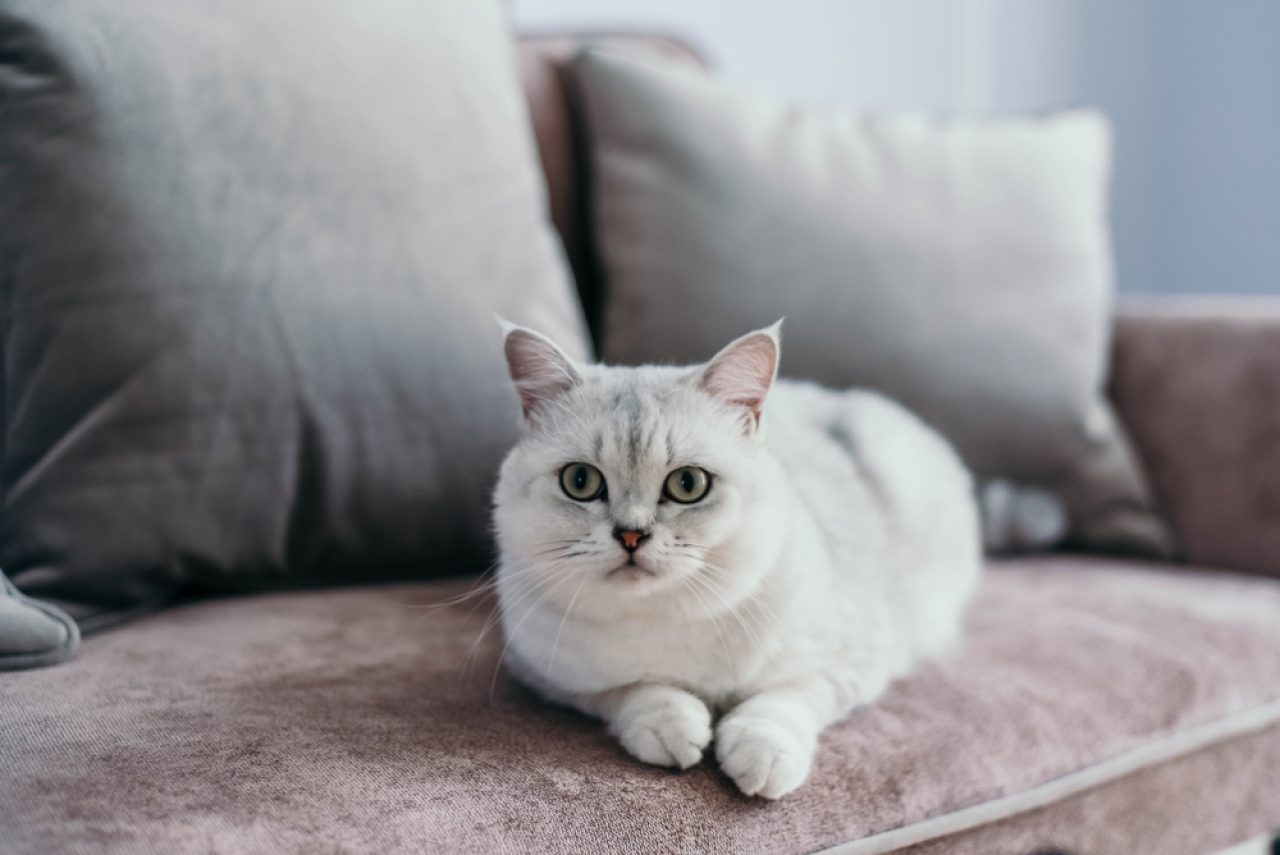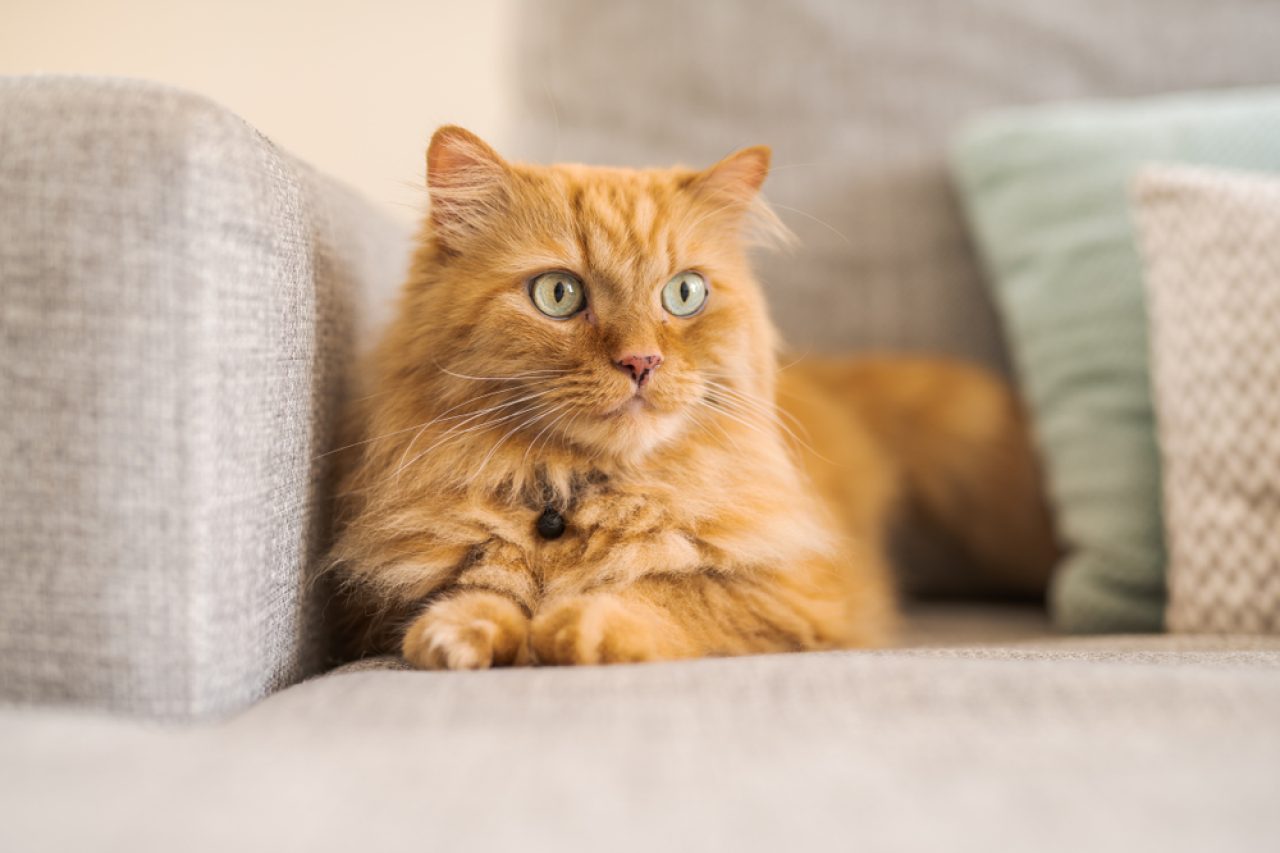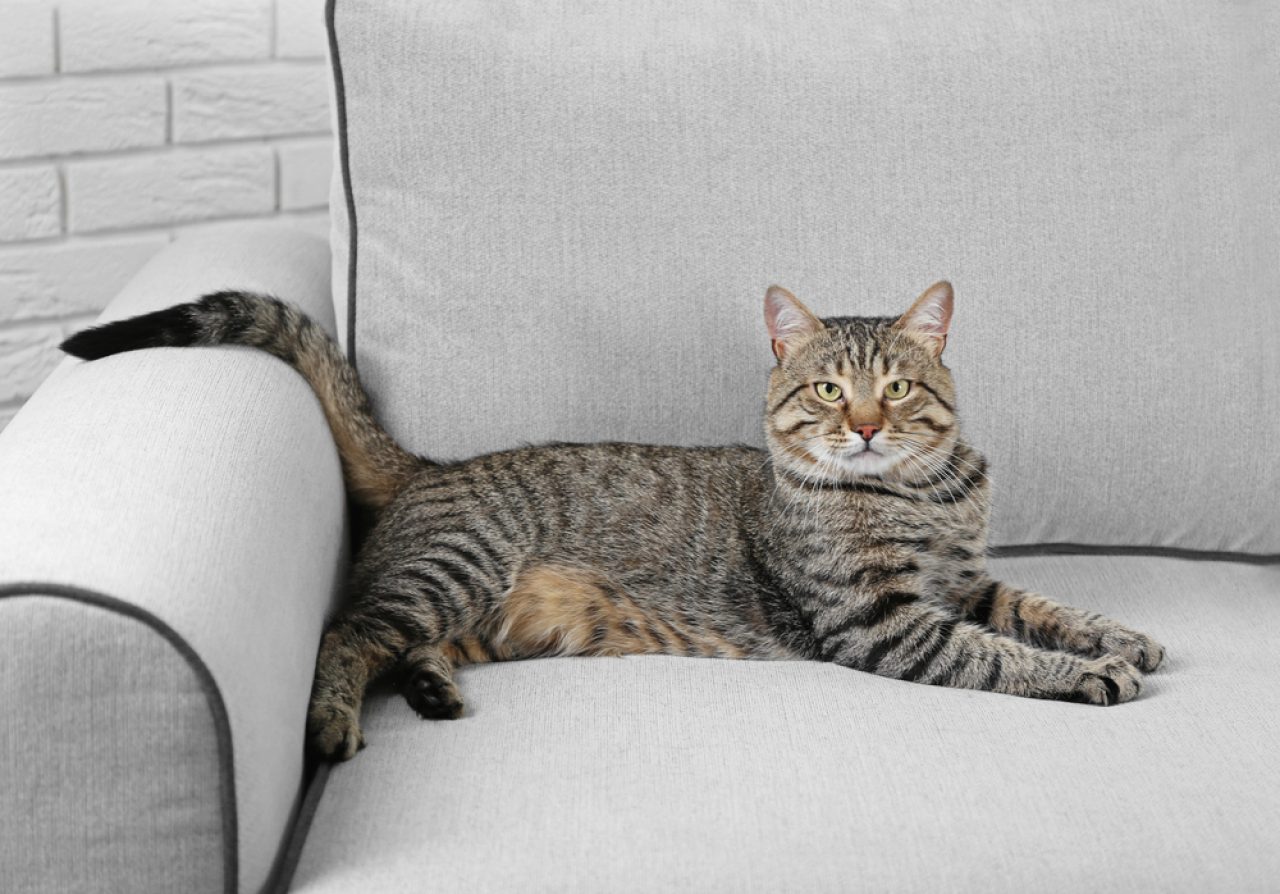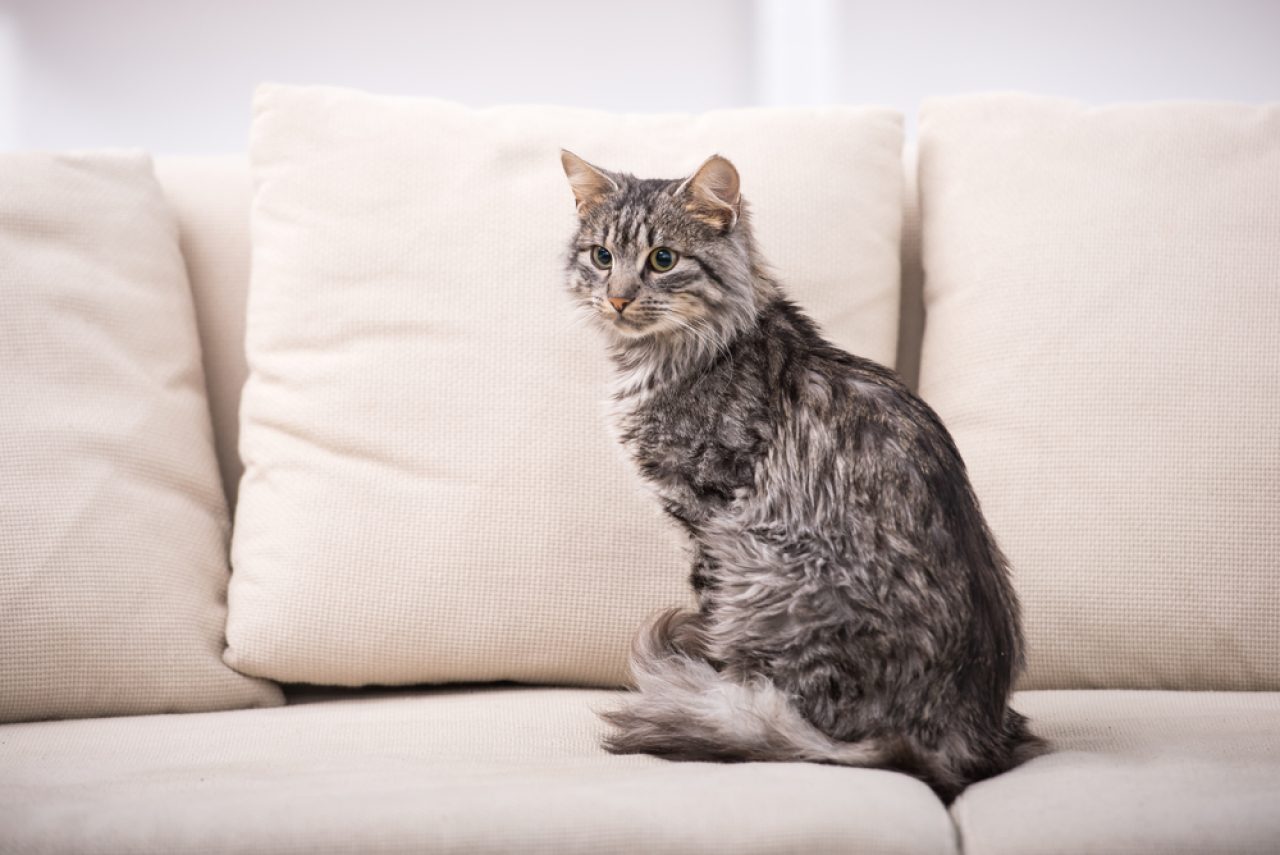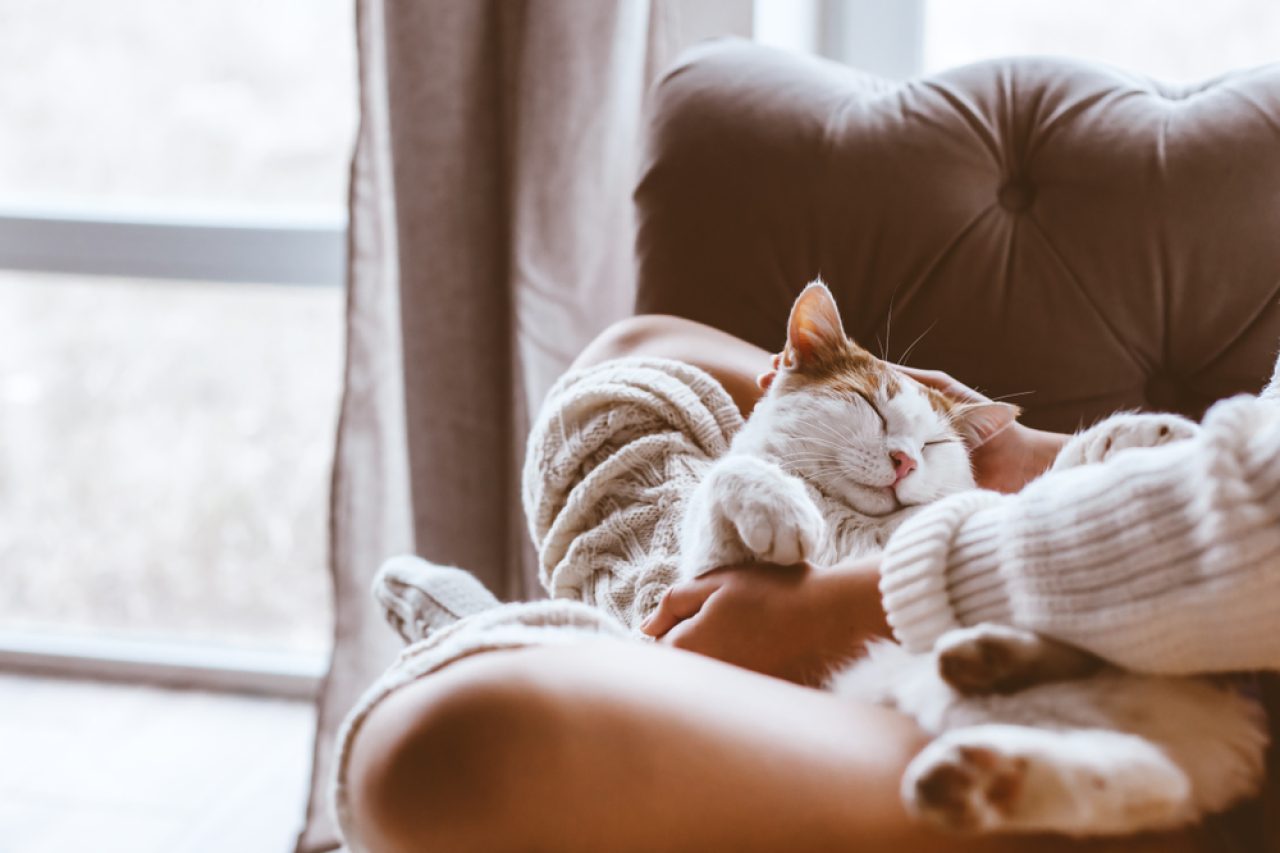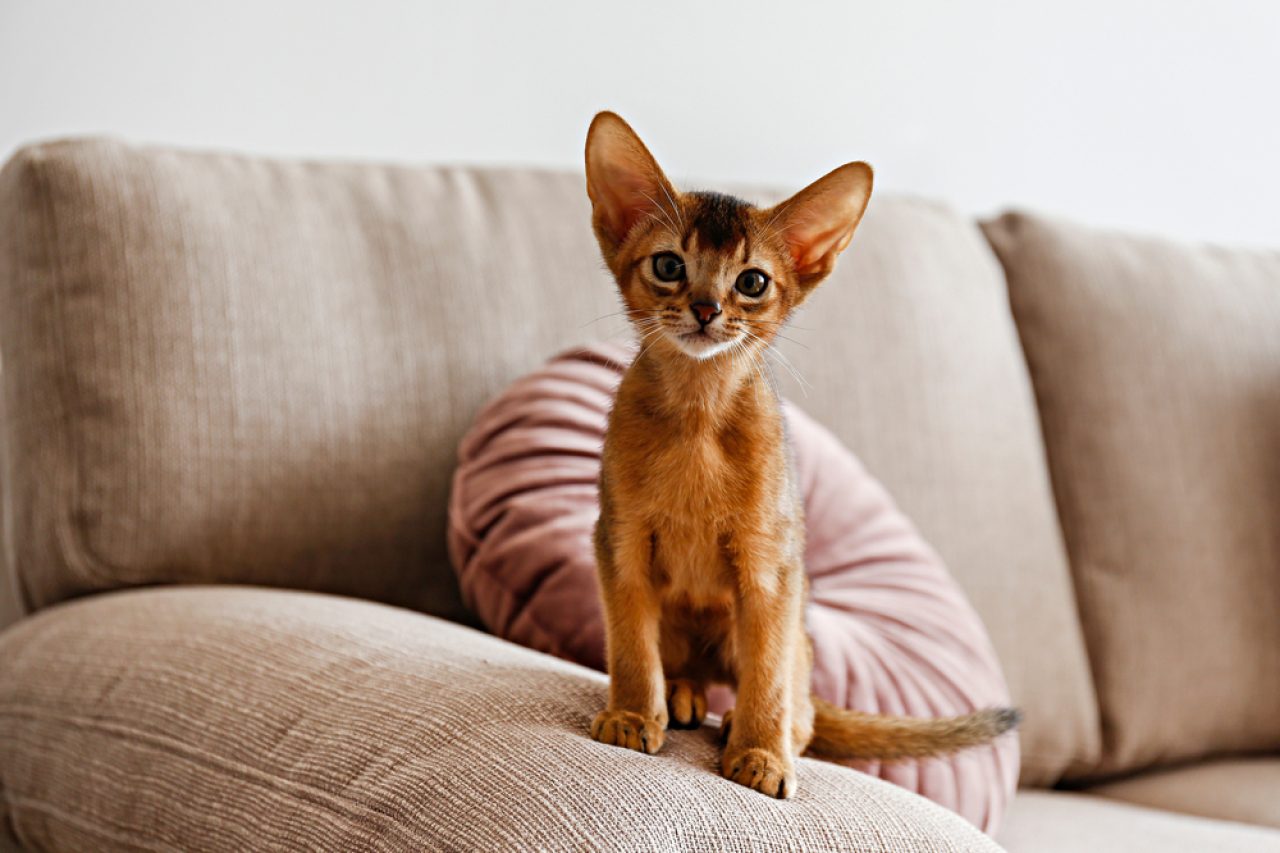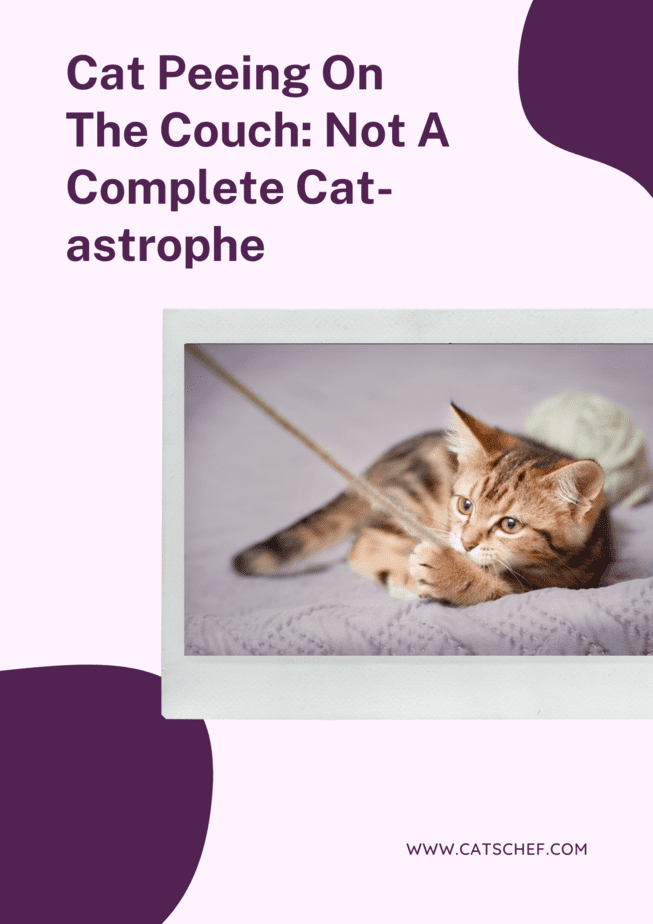📖 Table of Content:
You got your feline companion a nice litter box that you keep clean and fresh. He’s got his own restroom area that he can use whenever he needs it. Yet, you still find your cat peeing on the couch. That’s probably the last place you’d expect, but with indoor cats, it happens a lot more than you’d think.
Your couch was supposed to be a place where you and your cat spend cute bonding time cuddling and relaxing. Or so you thought. Your cat, apparently, has a different idea of what your sofa is supposed to be used for.
Before you get annoyed with your feline companion, you should know that it’s probably not his fault. There are many reasons why your cat might be peeing outside his litter box, and it’s usually out of his control. He’s not doing it out of spite, revenge or just to be naughty.
If your notice your cat peeing on the couch often, it’s a good thing you’re here. This change of behavior is usually a sign of some other issues your kitty is trying to focus your attention on. Don’t worry, you can put your mind to rest as we’re here to figure it out together and alleviate the problem.
Cat peeing on the couch: 7 possible reasons & solutions
Whether it’s a serious issue or just your cat’s preference, you should never ignore the fact that your cat is peeing on your couch. It can mean many things, but it’s never just because he feels like it.
It’s a good and strong indicator that there’s something wrong. If you don’t know what it could be, we’ve listed seven main things you should focus your attention on until you find the one bothering your fluff.
1. An underlying medical problem
The first one, and the one that you should definitely focus on the most, is the possibility that your cat has a medical issue you’re not aware of. We know, this is probably the last thing you wanted to read. It’s highly likely that this isn’t the case, but it’s still better to be safe than sorry and visit a vet.
Whether your cat is peeing on the couch, on your bed, or anywhere else outside of the litter box, there are some medical issues that could be the reason. The most common ones are urinary tract infections, arthritis, and diabetes.
Besides those, there can be other more serious health issues that usually cause pain and discomfort. It’s crucial that a professional examine your cat and gives you a proper diagnosis. If you’re lucky, then you’ll find out your furbaby is perfectly healthy, so you can focus on other possible reasons.
2. The king doesn’t like his litter box
It’s no secret that cats are picky divas. If your cat is peeing on the couch, there’s a high possibility that the litter box doesn’t suit him. Picking one for your feline friend seems like an easy thing to do, but there are some things you must pay attention to.
It’s important to choose a litter box that’s the right size for your cat. He should be able to move around a little bit and have space to scratch and dig. It’s their natural instinct and all cats do it, whether they’re urinating outside or in the box filled with litter.
Another thing to pay attention to is accessibility. Whether your fuzzball is a senior cat or a kitten, he might have issues entering his litter box if the sides are too high. If that’s the case, peeing on the couch becomes a lot easier than crossing the barrier.
It could be that your cat simply doesn’t like the litter you use. We want what’s best for our feline babies, but sometimes it gets too expensive to keep up with their good taste. We reach out for that cheaper bag of litter, thinking there’s no way they’ll notice – wrong.
It’s important that your cat likes how the litter feels under his little paws. This might take a few visits to the pet store until you find the perfect one but, once you do – it’s a game-changer.
Lastly, ask yourself – are you guilty of not cleaning his litter regularly? We’ve all been there; sometimes we’re just too lazy to do it. When you get to that point, think if you’d rather take a few minutes to clean his litter box, or spend ages getting the urine out of your beautiful couch.
3. Sharing is not caring
We all know cats can get possessive, especially when it comes to things they use when they need peace and quiet, such as their litter box area. If your home is a multiple-cat household, first of all – we envy you, second of all – you need enough litter boxes for all of them.
In the best-case scenario, each of your cats will have his own litter box, plus an extra one just in case. If they don’t, your household will quickly lose its catmony. It’s more likely that conflict will arise no matter how much we want our fur children to get along.
Cat fights aren’t the only thing you want to avoid with this. It’s possible that one of your cats will stop your other fluffer from entering their litter box. Not only will that create a stressful situation for both of them (and you), but the poor buddy will have no other option but to go wee-wee somewhere else.
4. Your cat can’t deal with stress
If there’s one thing my cat and I have in common – it’s that we don’t deal well with stress. Our four-legged friends are like old souls trapped in tiny fluffy bodies. They enjoy their peace and quiet. Any shifts in their peaceful environment can lead to behavioral changes.
So, it shouldn’t come as a surprise if your stressed-out cat decides to pee on your couch or any other unusual place. Our furry friends are creatures of habit. Any slight changes in your home can disrupt their peace, so give them some time to adjust.
To help your snuggle bug, try to think of a reason that’s causing your cat to feel stressed. Have you moved or just welcomed a baby into your home? Do you have a new partner that your kitty is still getting used to? There are many reasons that can lead to stress, so think of any changes you’ve recently made.
Once you find the root of the problem, it becomes a lot easier for you to help your paw buddy. If there’s a new baby that’s causing stress, try limiting your cat’s time with her. Give him some time to get to know her and they’ll soon become best buddies for life.
If, on the other hand, you’ve just recently moved, your cat will need a little bit of time to get used to the new environment, and that’s okay. It’s important to understand how this can impact your cat and give him peace to explore. He’ll end up having fun and falling in love with his new home.
5. Consider changing the location of the litter box
Think about the location of your cat’s litter box. Although it might be convenient for you, it could be causing your kitty a certain amount of stress. If using the litter box makes your cat anxious, peeing on the couch will become a lot easier for your purrer.
You should avoid putting his box in a loud and busy area, as this can disrupt his peace and make him not want to go anywhere near it. Another thing you should pay attention to is accessibility. Putting his litter in the basement or a closed balcony is probably not a good idea.
If you live in a house, we recommend you put your paw’s litter box on the main floor, possibly in a quiet and private location. Just like humans, cats need privacy when using the restroom, so make sure you understand and meet your furbaby’s needs. If anything, it will help you keep your couch clean.
Because they feel unsafe, some cats don’t like urinating on the floor, where most of us put our floofs’ litter boxes. If this is the case, you’ll notice your cat peeing on the couch instead because it’s more lifted. When he’s off the floor, he gets a better view of the area and possible escape routes.
If you have a toddler or another pet running around your home, it could be a potential threat to your furry ball of stress. To avoid this, try lifting his litter box on the table or any other elevated space. It will definitely make him feel a lot safer.
6. Your cat is super territorial
In nature, cats spray urine to mark their territory, and some of them don’t lose that side of them. This could be another possible reason why your cat is peeing on the couch, especially if you’ve just welcomed a new pet into your home.
This behavior is notably common among unneutered and unspayed kitties. It’s their way of letting other cats know they’re ready to mate, and your couch might fall victim to it. It’s in their blood, so don’t get angry at your cat for following his instincts.
Instead, if you haven’t neutered or spayed your cat, we recommend you do it as soon as possible. Not only will your furbaby live a more peaceful life, but it will stop him from peeing around your home.
If you’ve just introduced a new pet to your family, arm yourself with patience and understanding. Your feline king might need some time to get used to a new set of paws running around his kingdom. The inappropriate peeing will likely stop once he goes back to feeling safe in his home again.
7. Separation anxiety isn’t easy
Every cat parent’s dream is to have a close bond with their furchild. However, that special bond can come with a price, as our lovely companions can develop separation anxiety. If you notice your cat peeing on the couch, it could be because he’s upset that you’re not around.
Cats often act like children, and we should treat them as such. They can get anxious when their favorite person is not home for an extended period. A good indicator that your cat’s dealing with separation anxiety is excessively meowing, wandering around, and defecating in inappropriate places.
To keep your cat-loving heart from breaking, ask your friend or a family member to visit your cat daily if you plan on leaving for a longer period. Having some company could make your furball feel less lonely, and it could help greatly with separation anxiety, too.
Another thing you can do is place things that carry your scent all around your home. This way, your cat will feel like you’re there and they’ll feel less alone. Cats are friendly animals and they need company, even when they seem like they could conquer the world all by themselves.
How to clean your cat’s urine from the couch
The only thing worse than having to deal with a cat who’s peeing on the couch is having to clean up the mess he’s made. Hey, being a cat parent comes with a lot of challenges, but we’re all in this together. We’ve listed 4 of the best ways you can clean your cat’s pee from your beautiful sofa.
1. Completely strip your sofa covers
When it comes to cleaning cats’ pee from the fabric, time is the most important factor. It’s important not to let the urine dry completely. We recommend striping down your sofa, removing blankets and pillows – and throwing them all in the washing machine. That way, you’ll know they’ll be completely clean.
When it comes to the couch itself, in no time, the stains will begin to show. To avoid this, you should get to cleaning as quickly as possible.
2. Blacklight is your best friend
Sometimes, it’s hard to locate all of the stains on your couch, especially if your feline friend decided to leave marks on different parts of it. If you don’t locate every stain, it could encourage your kitty to urinate in the same spot again.
That’s when using blacklight comes in handy. Not only will it make you feel like an FBI detective, but it will also help you identify all the urine stains you’ve accidentally missed. In the dark, urine spots will appear to be yellowish, and they’ll be much easier to clean.
3. Stay away from ammonia-based cleaners
If you want to keep your cat away from peeing on your couch again, we recommend you avoid using ammonia-based cleaners. Since cats’ pee already contains ammonia, this type of cleaner will only worsen the smell, which can motivate your cat to urinate in that spot again.
Instead, try using an enzymatic cleaner. Simply following the instructions on the packaging should do the trick. Don’t forget to consult with your couch’s manufacturer as well, just to make sure you’re not creating another problem for yourself to deal with in the future.
4. DIY solutions are always a good idea
If you’re a DIY queen, you might like this option the best. Cleaning your cat’s pee from the couch with the solution you made yourself is just as effective as using the one from the store. It’s a cheap and fun alternative, and you probably already have everything you need.
For fresh urine stains, mix one tablespoon of dishwashing liquid detergent with two cups of cold water. Add one tablespoon of vinegar, stir it gently, and you’ve got yourself a perfectly fine cleanser. After blotting the urine stain, start gently cleaning it with a microfiber cloth that you’ve previously dipped in your solution.
